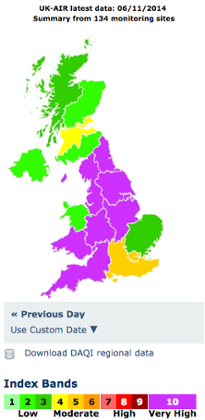Government advises people to reduce physical activity after fireworks night and still weather lead to a '10 out of 10' pollution reading across much of England and Wales
The government is urging people to reduce their physical activities, particularly outdoors, after pollution levels across much of England and Wales peaked because of a combination of fireworks night and unusually still weather.
Pollution levels across the north and south-west of England, the Midlands, and south Wales are now "very high" meaning that the official health advice now urges people with lung problems, heart problems, and older people, to avoid strenuous physical activity, while people with asthma are told they may need to use their reliever inhaler more often.
According to the advice the general population should: "Reduce physical exertion, particularly outdoors, especially if you experience symptoms such as cough or sore throat."
Readings from the government's monitoring network show pollution at 10 out of 10 on the Daily Air Quality Index rankings, across the country. During the Sahara dust smog episode in April, pollution was at similar levels across the south-east and London.
Pollution levels peak annually after particulate pollution from bonfires and fireworks and often fall rapidly as they are dispersed by the wind.
Fog and still weather has led to this morning's warnings, but the environment department's UK Air unit said the very high pollution would clear and return to low throughout the day.
Data from 9am shows very high levels for the whole of England and Wales except for the south-east where levels are moderate, and East Anglia and north Wales, where they are low. Scotland had relatively low levels of pollution on Thursday morning.

A Met Office spokeswoman said an area of low pressure was moving from west to east, which will bring wet and windy weather and sweep a lot of the pollution away later today.
Fireworks night and still weather have led to very high pollution levels in England and Wales. Photograph: Alamy






